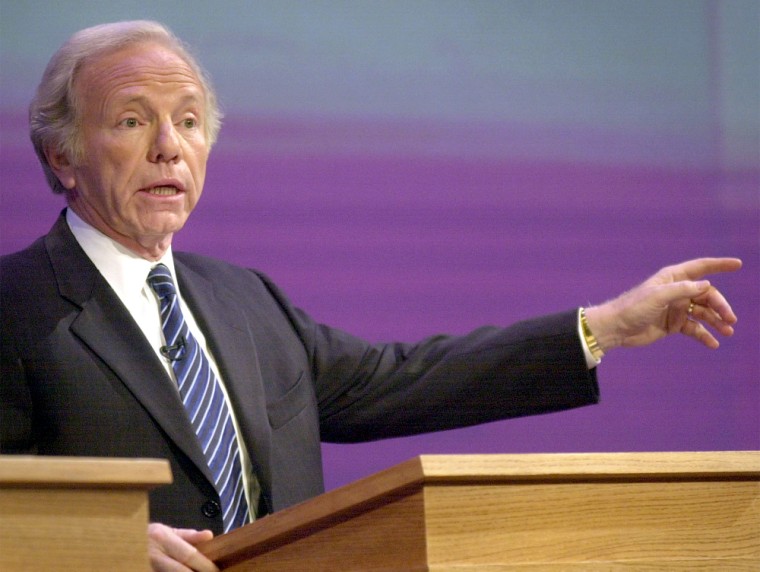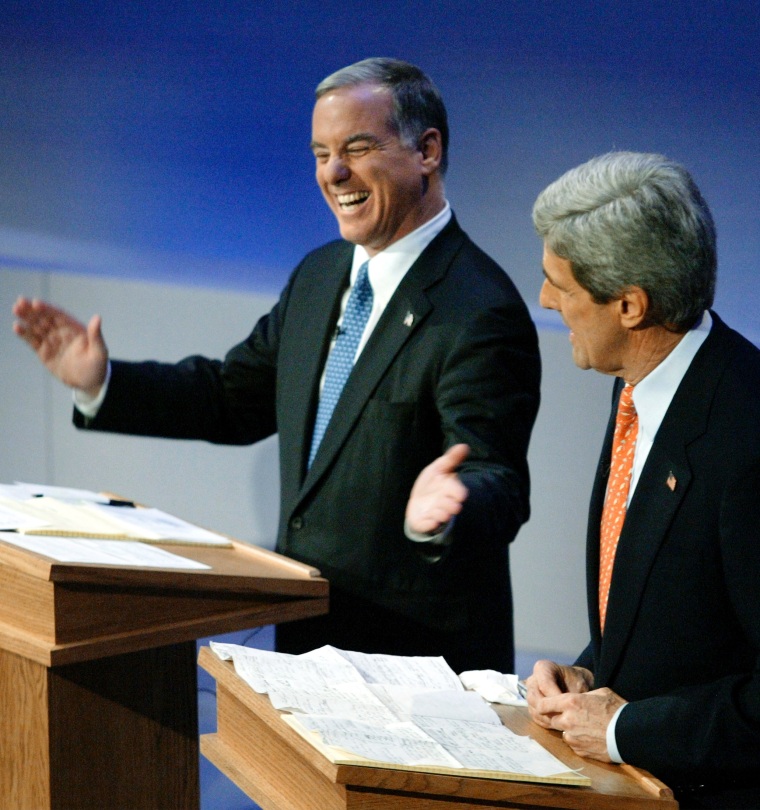Eight Democratic presidential contenders strongly disputed Tuesday that Howard Dean was the party's best chance for beating President Bush or that former Vice President Al Gore's endorsement of the front-runner would seal the nomination.
"This race is not over," Sen. John Kerry of Massachusetts declared as the candidates gathered in this first-in-the-nation primary state for the year's eighth and final debate. The first votes will be cast in Iowa's Jan. 19 caucuses and New Hampshire's Jan. 27 primary.
One after another, the field ganged up on Dean, who holds a double-digit lead in New Hampshire polls, and Gore in an effort to take the luster off the newly minted endorsement. They appealed to the independent streak of voters here and suggested that the endorsement smacked of old-style party machine politics.
Sen. Joseph Lieberman of Connecticut, Gore's spurned 2000 running mate, asserted that "my chances have actually increased today." He said people had stopped him in the airport to express outrage over Gore's backing of Dean.
For his part, Dean told the others: "Attack me. Don't attack Al Gore. I don't think he deserves to be attacked by anybody up here."
Gore on center stage
Clearly, Gore's endorsement overshadowed the debate. In 2000, Gore won the popular vote by half a million votes but conceded to Bush after a tumultuous 36-day recount in Florida and a 5-4 Supreme Court vote against him. The endorsement of Bill Clinton's No. 2 was a coveted prize for the Democratic hopefuls.
The response to Gore's stunning decision was precipitated when one of the debate's moderators, ABC's Ted Koppel, opened the debate by inviting the field of nine candidates to "raise your hand if you believe that Governor Dean can beat George Bush."
Only one, Dean, raised his hand.

In endorsing Dean earlier in the day at campaign stops in New York and Iowa, Gore urged Democrats to unite behind the front-runner and said, "We don't have the luxury of fighting among ourselves."
That touched off an avalanche of criticism from Dean's rivals.
The Rev. Al Sharpton said Gore's tactics smacked of "bossism," and added: "We're not going to have any big name come in now and tell us the field should be limited. ... No Democrat should shut us up today."
Said Sen. John Edwards of North Carolina: "We're not going to have a coronation."
And Rep. Dick Gephardt of Missouri declared, "I'm sure all of us think we have the best chance to beat George Bush." But, he said, he stood a better chance than the others in the battleground states of the Midwest that would likely decide the election.
Democratic strategists said Gore's endorsement had an immediate impact, if only by giving Dean's rivals something to complain about other than Dean's policies and campaign miscues.
"It was not the pile-on that Dean expected. Dean came with his best Teflon suit, but he didn't need it," said Donna Brazile, a former Gore adviser who is not tied to any of the candidates.
Kucinich takes on status quo
The nine candidates stood at wooden podiums arranged in a semicircle on the stage of a theater on the University of New Hampshire campus. Some Democrats have suggested that the debates have been unwieldy and should be limited to the major candidates. One of the long-shot candidates, Rep. Dennis Kucinich of Ohio, took exception with Koppel's questions and used it to challenge the political status quo.
"I want the American people to see where media takes politics in this country," Kucinich said to cheers from the crowd. "We start talking about endorsements, now we're talking about polls and then talking about money. When you do that, you don't have to talk about what's important to the American people."
As the debate focused on other topics, Dean was asked about public comments about what Bush might have known before the Sept. 11, 2001, terrorist attacks. Several Republicans have criticized him for mentioning speculation in several broadcast interviews that Bush may have been tipped off about the attacks, perhaps by the Saudis.
He insisted that he never believed such reports and was just mentioning "the most interesting theory that I heard, which I did not believe, [which] was that the Saudis had tipped him off."
Still, Dean said, "We need to know what went wrong before 9/11. ... There are going to be a lot of crazy theories."
Kerry, meanwhile, was asked whether Democrats could win in conservative, deeply religious parts of the South, given the importance Bush has put on religion. In particular, he was asked about a comment by Dean that religion did not play into his policy decisions.
"There is nothing conservative or traditionally Republican about this administration," Kerry said. "It is radical in the way that it has trampled on that fine line drawn between church and state and in the way it has trampled, through its attorney general, on the civil rights of Americans."
More anti-war arguments
The debate brought fresh attacks on the Bush administration's Iraqi policy. Questioned about an hours-old Pentagon order barring companies from countries opposed to the war from bidding on reconstruction contracts, Kerry said, "I can't think of anything dumber."
Dean also disputed a suggestion by Sen. Hillary Rodham Clinton, D-N.Y., who visited Iraq late last month, that a large force of U.S. troops might have to remain in Iraq for some time.
"I don't share that view," Dean said. "I think we need to bring in foreign troops."
But the liveliest exchanges came on the subject of Gore's endorsement.
Calling himself a champion of the moderate, fiscally conservative, tough-on-security wing of the Democratic Party, Lieberman said: "Howard Dean — and now, I guess, Al Gore — are on the wrong side of those issues."
Clark threw Gore's words back in his face, saying: "To quote another former Democratic leader, I think elections are about people, not about the powerful. I think it was Al Gore who said that."
